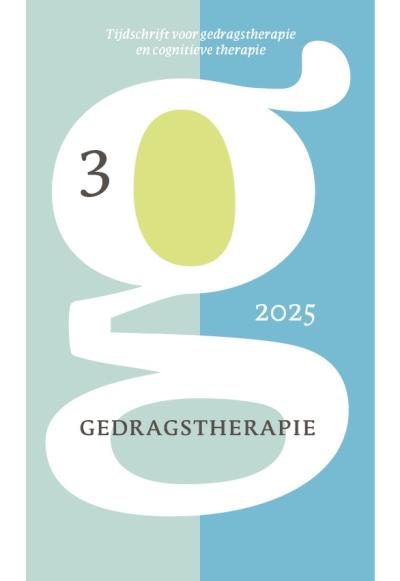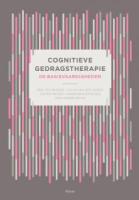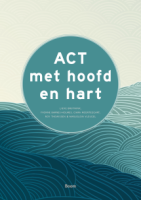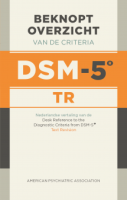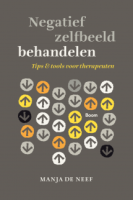Inhoud
Chronische depressie versus niet-chronische depressie
Samenvatting
Chronische depressies en depressies van kortere duur verschillen niet alleen wat betreft beloop van elkaar, maar ook wat betreft risicofactoren en behandelresultaat. Deze verschillen wijzen er op dat chronisch depressieve patiënten een specifieke groep vormen en dat zij mogelijk een andere aanpak nodig hebben dan niet-chronisch depressieve patiënten. In dit artikel komen de tot dusver gevonden verschillen tussen deze twee soorten depressie aan de orde, evenals de implicaties hiervan voor de klinische praktijk.
Literatuur
- Akiskal, H.S. (1982). Factors associated with incomplete recovery in primary depressive illness. Journal of Clinical Psychiatry, 266-271.
- Akiskal, H.S. (1983). Dysthymic disorder: psychopathology of proposed chronic depressive subtypes. American Journal of Psychiatry, 140, 11-20.
- Angst, J., Gamma, A., Rössler, W., Ajdacic, V., & Klein, D.N. (2009). Long-term depression versus episodic major depression: Results from the prospective Zurich study of a community sample. Journal of Affective Disorders, 112-121.
- Arnow, B.A., & Constantino, M.J. (2003). Effectiveness of psychotherapy and combination treatment for chronic depression. Journal of Clinical Psychology, 59, 893-905.
- Bifulco, A., Moran, P.M., Baines, R., et al. (2002). Exploring psychological abuse in child hood: II. Association with other abuse and adult clinical depression. Bulletin of the Menninger Clinic, 241-258.
- Blom, M.B.J., & Jonker, K. (2005). Chronisch maar niet hopeloos. Een overzicht van de psychotherapeutische mogelijkheden bij chronische depressie en dysthymie. Maandblad voor de Geestelijke Volksgezondheid, 995-1007.
- Blom, M.B.J., Spinhoven, P., Hoffman, T.O., et al. (2007). Severity and duration of depression, not personality factors, predict short term outcome in the treatment of major depression. Journal of Affective Disorders, 119-126.
- Brown, G.W., & Moran, P. (1994a). Clinical and psychosocial origins of chronic depressive episodes. I: A community survey. British Journal of Psychiatry, 447-456.
- Brown, G.W., Harris, T.O., Hepworth, C., et al. (1994b). Clinical and psychosocial origins of chronic depressive episodes. II. A patient enquiry. British Journal of Psychiatry, 457-465.
- Brown, G.W., Craig, T.K., Harris, T.O., et al. (2007). Development of a retrospective interview measure of parental maltreatment using the Childhood Experience of Care and Abuse (CECA) instrument – A life-course study of adult chronic depression - 1. Journal of Affective Disorders, 205-215.
- Cronkite, R.C., Moos, R.H., Twohey, J., Cohen, C., & Swindle, R. Jr. (1998). Life circumstances and personal resources as predictors of the ten-year course of depression. American Journal of Community Psychology, 26, 255-80.
- Cuijpers, P., Van Straten, A., Schuurmans, J., Van Oppen, P., Hollon, & S.D., Andersson, G. (2009). Psychotherapy for chronic major depression and dysthymia: A meta-analysis. Clinical Psychology Review, in press.
- Duggan, C.F., Lee, A.S., & Murray, R.M.(1990). Does personality predict long-term outcome in depression? British Journal of Psychiatry, 19-24.
- First, M.B., Donovan, S., & Frances, A. (1996). Nosology of chronic mood disorders. Psychiatric Clinics of North America, 29-39.
- Fournier, J.C., DeRubeis, R.J., Shelton, R.C., Hollon, S.D., Amsterdam, J.D., & Gallop, R. (2009). Prediction of response to medication and cognitive therapy in the treatment of moderate to severe depression. Journal of Consulting and Clinical Psychology, 775-87.
- Gilmer, W.S., Gollan, J.K., Wisniewski, S.R., Howland, R.H., Trivedi, M.H., Miyahara, S., Fleck, J., Thase, M.E., Alpert, J.E., Nierenberg, A.A., Warden, D., Fava, M., & Rush, A.J., (2008). Does the duration of index episode affect the treatment outcome of major depressive disorder? A STAR*D report. J Clin Psychiatry, 69, 1246-1256
- Hayden, E.P., & Klein, D.N. (2001). Predicting the outcome of dysthymic disorder at 5-year follow-up: The impact of familial psychopathology, early adversity, personality, comorbidity, and chronic stress. American Journal of Psychiatry, 1864-1870.
- Hays, J.C., Krishnan, K.R., George, L.K., Pieper, C.F., Flint, E.P., & Blazer, D.G. (1997). Psychosocial and physical correlates of chronic depression. Psychiatry Research, 10, 72, 149-59.
- Hirschfeld, R.M.A. (1990). Personality and dysthymia. In: Burton, S.W., Akiskal, H.S, Editors, Dysthymic disorder. London: Gaskell.
- Hirschfeld, R.M., Dunner, D.L., Keitner, G., et al. (2002). Does psychosocial functioning improve independent of depressive symptoms? A comparison of nefazodone, psychotherapy, and their combination. Biological Psychiatry, 123-133.
- Hollon, S.D., Shelton, R.C., Wisniewski, S., et al. (2006). Presenting characteristics of depressed outpatients as a function of recurrence: preliminary findings from the STAR*D clinical trial. Journal of Psychiatric Research, 40, 59-69.
- Judd, L.L., Akiskal, H.S., Maser, J.D., et al. (1998). A prospective 12-year study of subsyndromal and syndromal depressive symptoms in unipolar major depressive disorders. Archives of General Psychiatry, 55, 694-700.
- Just, N., & Alloy, L.B. (1997). The response styles theory of depression: tests and an extension of the theory. Journal of Abnormal Psychology, 106, 221-229.
- Landelijke Stuurgroep Multidisciplinaire Richtlijnontwikkeling in de GGZ [2005]. Richtlijn voor de diagnostiek en behandeling van volwassen cliënten met een depressie 2005. Websites: www.ggzrichtlijnen.nl; www.cbo.nl. (2005).
- Keller, M.B. (1994). [Long-term treatment of depression]. Fortschritte der Neurologie-Psychiatrie, 62, 32-38.
- Keller, M.B., McCullough, J.P., Klein, D.N., et al. (2000). A comparison of nefazodone, the cognitive behavioral-analysis system of psychotherapy, and their combination for the treatment of chronic depression. New England Journal of Medicine, 342, 14621470.
- Kessler, R.C., Davis, C.G., & Kendler, K.S. (1997). Childhood adversity and adult psychiatric disorder in the US National Comorbidity Survey. Psychological Medicine, 27, 1101-1119.
- Klein, D.N., Taylor, E.B., Dickstein, S., & Harding, K. (1988). Primary early-onset dysthymia: comparison with primary nonbipolar nonchronic major depression on demographic, clinical, familial, personality, and socioenvironmental characteristics and shortterm outcome. Journal of Abnormal Psychology, 97, 387-398.
- Klein, D.N., Riso, L.P., Donaldson, S.K., Schwartz, J.E., Anderson, R.L., Ouimette, P.C., Lizardi, H., & Aronson, T.A. (1995). Family study of early-onset dysthymia. Mood and personality disorders in relatives of outpatients with dysthymia and episodic major depression and normal controls. Archives of General Psychiatry, 52, 487-96.
- Klein, D.N., & Santiago, N.J. (2003). Dysthymia and chronic depression: introduction, classification, risk factors, and course. Journal of Clinical Psychology, 59, 807-816.
- Klein, D.N., Schwartz, J.E., Rose, S., et al. (2000). Five-year course and outcome of dysthymic disorder: A prospective, naturalistic follow-up study. American Journal of Psychiatry, 157, 931-939.
- Klein, D.N., Santiago, N.J., Vivian, D., et al. (2004). Cognitive-behavioral analysis system of psychotherapy as a maintenance treatment for chronic depression. Journal of Consulting and Clinical Psychology, 72, 681-688.
- Kocsis, J.H. (2003). Pharmacotherapy for chronic depression. Journal of Clinical Psychology, 59, 885-892.
- Kuehner, C., & Weber, I. (1999). Responses to depression in unipolar depressed patients: an investigation of Nolen-Hoeksema's response styles theory. Psychological Medicine, 29, 1323-1333.
- De Maat, S.M., Dekker, J., Schoevers, R.A., et al. (2007). Relative efficacy of psychotherapy and combined therapy in the treatment of depression: a meta-analysis. European Psychiatry, 22, 1-8.
- Maddux, R.E., Riso, L.P., Klein, D.N., et al. (2009). Select comorbid personality disorders and the treatment of chronic depression with nefazodone, targeted psychotherapy, or their combination. Journal of Affective Disorders,
- Manber, R., Kraemer, H.C., Arnow, B.A., et al. (2008). Faster remission of chronic depression with combined psychotherapy and medication than with each therapy alone. Journal of Consulting and Clinical Psychology, 76, 459-467.
- Markowitz, J.C. (2003). Interpersonal psychotherapy for chronic depression. Journal of Clinical Psychology, 59, 847-858.
- McCullough, J.P. (2000). Treatment for Chronic Depression. Cognitive Behavioral Analysis System of Psychotherapy. New York: The Guilford Press.
- McCullough, J.P., Kornstein, S.G., Belyea-Caldwell, S., et al. (1996). Differential diagnosis of chronic depressive disorders. Psychiatric Clinics of North America, 19, 55-71.
- Nemeroff, C.B., Heim, C.M., Thase, M.E., et al. (2003). Differential responses to psycho therapy versus pharmacotherapy in patients with chronic forms of major depression and childhood trauma. Proceedings of National Academy of Sciences U.S.A, 100, 14293-14296.
- Nolen-Hoeksema, S. (1991). Responses to depression and their effects on the duration of depressive episodes. Journal of Abnormal Psychology, 100, 569-582.
- Pampallona, S., Bollini, P., Tibaldi, G., et al. (2004). Combined pharmacotherapy and psychological treatment for depression: a systematic review. Archives of General Psychiatry, 61, 714-719.
- Peselow, E.D., Robins, C., Block, P., Barouche, F., & Fieve, R.R. (1990). Dysfunctional attitudes in depressed patients before and after clinical treatment and in normal control subjects. American Journal of Psychiatry, 147, 439-444.
- Rhebergen, D., Beekman, A.T.F., Graaf, R. de, Nolen, W.A., Spijker, J., Hoogendijk, W.J., & Penninx, B.W.J.H. (2009). The three-year naturalistic course of major depressive disorder, dysthymic disorder and double depressin. Journal of Affective Disorders, 115, 450-459.
- Riso, L.P., Miyatake, R.K., & Thase, M.E. (2002). The search for determinants of chronic depression: a review of six factors. Journal of Affective Disorders, 70, 103-115.
- Riso, L.P., du Toit, P.L., Blandino, J.A., Penna, S., Dacey, S., Duin, J.S., et al. (2003). Cognitive aspects of chronic depression. Journal of Abnormal Psychology, 112, 72-80.
- Riso, L.P., & Newman, C.F. (2003). Cognitive therapy for chronic depression. Journal of Clinical Psychology, 59, 817-831.
- Riso, L.P., & Klein, D.N. (2004). Vulnerability to chronic depression: A review and preliminary model. In: Alpert, J.E., Fava, M., Editors, Handbook of chronic depresson; diagnosis and therapeutic management. New York (2004).
- Robison, E.J., Shankman, S.A., & McFarland, B.R. (2009). Independent associations between personality traits and clinical characteristics of depression. Journal of Nervous and Mental Disorders, 197, 476-83.
- Rothschild, L., & Zimmerman, M. (2002). Personality disorders and the duration of depressive episode: a retrospective study. Journal of Personality Disorders, 16, 293-303.
- Satyanarayana, S., Enns, M.W., Cox, B.J., & Sareen, J. (2009). Prevalence and correlates of chronic depression in the Canadian community health survey: mental health and well-being. Canadian Journal of Psychiatry, 54, 389-98.
- Scott, J., Barker, W.A., & Eccleston, D. (1992). Can we predict the persistence of depression? British Journal of Psychiatry, 161, 633-637.
- Scott, J., Williams, J.M.G., Brittlebank, A., & Ferrier, I.N. (1995). The relationship between premorbid neuroticism, cognitive dysfunction and persistence of depression: a 1-year follow-up. Journal of Affective Disorders, 33, 167-172.
- Spijker, J., Bijl, R.V., Graaf, R. de, et al. (2004). [Depression: longer-lasting episode not an automatic indication for referral]. Nederlands Tijdschrift voor Geneeskunde, 148, 247-248.
- Teasdale, J.D. (1988). Cognitive vulnerability to persistent depression. Cognition and Emotion, 2, 247-274.
- Thase, M.E., Greenhouse, J.B., Frank, E., et al. (1997). Treatment of major depression with psychotherapy or psychotherapy-pharmacotherapy combinations. Archives of General Psychiatry, 54, 1009-1015.
- Torpey, D.C., & Klein, D.N. (2008). Chronic depression: update on classification and treatment. Current Psychiatry Reports, 10, 458-64.
- Watson, D., & Clark, L. A. (1995). Depression and the melancholic temperament. Europe an Journal of Personality, 9, 351-366.
- Weissman, M.M., Leaf, P.J., Bruce, M.L., et al. (1988). The epidemiology of dysthymia in five communities: rates, risks, comorbidity, and treatment. American Journal of Psychiatry, 145, 815-819.
- Wiersma, J.E., Schaik, D.J. van, Oppen, P. van, et al. (2008). Treatment of chronically depressed patients: a multisite randomized controlled trial testing the effectiveness of 'Cognitive Behavioral Analysis System of Psychotherapy' (CBASP) for chronic depressions versus usual secondary care. BioMedCentral Psychiatry, 8, 18.
- Wiersma, J.E., Hovens J.G.F.M., Oppen, P. van, et al. (2009). The Importance of Childhood Trauma and Childhood Life events for Chronicity of Depression. Journal of Clinical Psychiatry, 70, 983-989.
- Wiersma, J.E., Van Schaik, D.J.F., Blom, M.B.J., et al. (2009b). Behandeling voor chronische depressie: 'Cognitive Behavioral Analysis System of Psychotherapy' (CBASP). Tijdschrift voor Psychiatrie, 10, 727-736.
- Williams, J.M.G., Healey, D., Teasdale, J., White, W., & Paykel, E.S. (1990). Dysfunctional attitudes and vulnerability to persistent depression. Psychological Medicine, 20, 375-381.
 © 2009-2025 Uitgeverij Boom Amsterdam
© 2009-2025 Uitgeverij Boom Amsterdam
De artikelen uit de (online)tijdschriften van Uitgeverij Boom zijn auteursrechtelijk beschermd. U kunt er natuurlijk uit citeren (voorzien van een bronvermelding) maar voor reproductie in welke vorm dan ook moet toestemming aan de uitgever worden gevraagd:
Behoudens de in of krachtens de Auteurswet van 1912 gestelde uitzonderingen mag niets uit deze uitgave worden verveelvoudigd, opgeslagen in een geautomatiseerd gegevensbestand, of openbaar gemaakt, in enige vorm of op enige wijze, hetzij elektronisch, mechanisch door fotokopieën, opnamen of enig andere manier, zonder voorafgaande schriftelijke toestemming van de uitgever.
Voor zover het maken van kopieën uit deze uitgave is toegestaan op grond van artikelen 16h t/m 16m Auteurswet 1912 jo. Besluit van 27 november 2002, Stb 575, dient men de daarvoor wettelijk verschuldigde vergoeding te voldoen aan de Stichting Reprorecht te Hoofddorp (postbus 3060, 2130 KB, www.reprorecht.nl) of contact op te nemen met de uitgever voor het treffen van een rechtstreekse regeling in de zin van art. 16l, vijfde lid, Auteurswet 1912.
Voor het overnemen van gedeelte(n) uit deze uitgave in bloemlezingen, readers en andere compilatiewerken (artikel 16, Auteurswet 1912) kan men zich wenden tot de Stichting PRO (Stichting Publicatie- en Reproductierechten, postbus 3060, 2130 KB Hoofddorp, www.cedar.nl/pro).
No part of this book may be reproduced in any way whatsoever without the written permission of the publisher.
Inloggen VGCt en VVGT
Leden van de VGCt en de VVGT loggen in via de site van hun vereniging. Als u op die site bent ingelogd als lid, vindt u daar een button naar het Tijdschrift voor Gedragstherapie.
English
Behavioral Therapy: Journal for Behavioral Therapy and Cognitive Therapy ISSN 0167-7454
Information in English can be found here.



